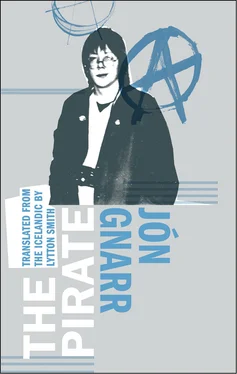There was a knock on my bedroom door. I looked up. Mom opened the door. She had a downcast expression.
“Come have a chat with me, Jón.”
She wasn’t angry. I hadn’t done anything. I’d even been unusually quiet. But whenever I heard that tone in her voice it meant she blamed me for something, like the time she found cigarettes in my pocket. Her voice sounded dry and windy. This time, though, she clearly wasn’t angry. She was almost friendly. She must have some news. I followed her into the kitchen and sat at the kitchen table. What was up? What did she want to tell me? Was she about to tell me I was adopted? That I wasn’t my father’s son, but the son of the famous Icelandic author Þórbergur Þórðarson? I’d long suspected that. I was so very like Þórbergur. Maybe Dad was always so weird around me because he wasn’t my real dad. And maybe he was always so annoyed at Mom because she’d cheated on him. Understandable. Perhaps I had other siblings out there. But maybe it wasn’t that at all. Could she be about to tell me they were going on vacation, and they were inviting me along? I never got to go anywhere with them because I was so much trouble. Recently, though, I’d been very calm. Could it be that Mom was rewarding me for being good by inviting me abroad? But where? Mallorca, perhaps. I’d need to get myself some cool swimming trunks and a necklace with my name on it. I’d go to the beach and have my picture taken with a parrot on my shoulder. Or were we going to London, instead? Mom had visited her friend in London several times. Now, perhaps, I’d get to go along with her. I’d rather go to London than Mallorca because I might get to meet a real punk and go to some gigs. And then I’d be able to buy some proper punk gear. I couldn’t imagine punk stuff was easy to find in Mallorca. I waited and waited for Mom to start talking. But she was just silent, friendly but awkward.
“What?” I asked, excited. I almost started laughing in anticipation.
“Grandma’s dead.”
My dreams of sunny beaches and bustling urban life vanished with the wave of a hand. I wasn’t going anywhere. Þórbergur was in all likelihood not my dad. And Grandma was dead.
“Is she?” I asked to say something.
“Yes, she died during the night.”
I hadn’t thought about Grandma much, or at all, since she went into the nursing home. I hadn’t been keen to visit; it seemed distinctly discomforting, going to see her. Not least because she’d become a bit confused by the end. She’d gotten so old that she’d started dying a long time back.
I’d known for a while Grandma would die soon. I knew it would happen. My grandmother was named Guðrún Guðmundsdóttir. She was born on April 1, 1888 at a place called Arnkötludalur, in the Strandir region. I don’t know where that is exactly. She had eighteen siblings. All of them were dead. Most of them died soon after being born or when they were still children. That’s how life was in the old days. People died all the time. When Grandma was seven, she lost her mother. She was from another world, a shadowy, ancient world where it was always cold and everyone was wet and either hungry or very ill the whole time. So they tended to die sooner or later. The men drowned, one after the other. Those who survived were hunched by life’s adversities. Like Grandma. I never knew how she made it through such a miserable life. Maybe it was because she was so good. Maybe it was her faith in God. Maybe she didn’t know anything better. Whatever it was, I counted myself lucky to have been born when I was. I was horrified when Grandma told stories about life in the country and about when she was young. She had been dying for a long time. Pitiless old age ferried her away — her spark weakened and flickered. She grew ever more tired, had trouble walking. She started to forget things. Sometimes, she forgot who I was. Sometimes, she thought I was my dad. It’s me, Jónsi , I’d say again and again to remind her. Sometimes she’d realize, but more often she didn’t. She’d keep asking for news about the farms or tell me she’d seen people I knew were long dead. She’d wandered back to a time that seemed to me like seventeen hundred and sour cabbage. It distressed me to see Grandma ebb away like this. Sometimes she got anxious about something she imagined was going to happen. Those times, she’d want me to ride out to some farms to warn people. I felt awkward, not knowing how to respond. I tried explaining that it was just her mental deterioration, but that didn’t compute. So I just tried to play along.
“Where are the children?”
“Um, they’re outside, playing,” I said, encouragingly.
“They’re not allowed to go down to the estuary. The current is too strong.”
“No, they’re nowhere near it, Grandma,” I said, still being encouraging.
She was sure the woman sharing her room was plotting to go through her stuff and steal from her. It was very awkward when she talked about that, but also a bit funny. Funny in an absurd, tragic way: the woman who shared the room with her was, in reality, paralyzed — she lay motionless in her bed. But Grandma was blind, so she couldn’t see that.
“What are you doing there?!” Grandma hissed.
“I’m not doing anything, Guðrún, dear,” the woman wearily answered.
“I can see you! What did you take from the drawer?” The paralyzed woman sighed sadly while I shook and trembled, stifling laughter at life’s absurdity.
And now Grandma was dead. I didn’t know what to say.
“Don’t you find it upsetting?”
“Of course.”
But I didn’t think it was upsetting. I thought it was just normal. People get old and die. Grandma had looked forward to dying. She wanted to die. So it definitely wasn’t upsetting; if she were alive, she’d be very pleased to be dead. It’s one thing when people die young or from a terrible disease like my uncle Gulli, who got lung cancer. But even he was fairly old. It was still miserable, though. I was actually almost glad that my grandmother was dead. It was what she wanted. I was more sorry we weren’t going abroad together. Death has three stages. The first is the physical death, which occurs when the heart ceases beating. The second stage is the wake, when friends and relatives see the dead person for the last time. The third and final stage of death is when someone mentions the name of the deceased for the final time.
Funerals are weird rituals. Death unites people. It’s like the pain of having lost someone to death stops being rote and distant — suddenly, it’s present and for real. People’s eyes meet, they cry together, and embrace one another. At a funeral, people reveal sides of themselves they never show anywhere else, except perhaps at home, behind closed doors. They openly weep in front of each other. They give deep hugs, even if they’re not the kind of people who usually embrace. At Christmas and birthdays, everyone says hello with a handshake. Not at funerals. Death draws forth the life in people, forcing them to take down their masks and show their true faces. People who haven’t spoken in years start talking to one another again — facing death, people often realize that their everyday concerns are inconsequential. Old enemies make truces and new friendships blossom. Death is something we all share. He ambushes us all. Eventually. No matter how rich, beautiful, or strong we are. No one escapes death.
I went to several funerals over the years. Many of Mom and Dad’s siblings have died. I preferred being at funerals with Mom’s family. Especially once people start drinking toasts: they’d begin to laugh and tell stories about the deceased.
Читать дальше











